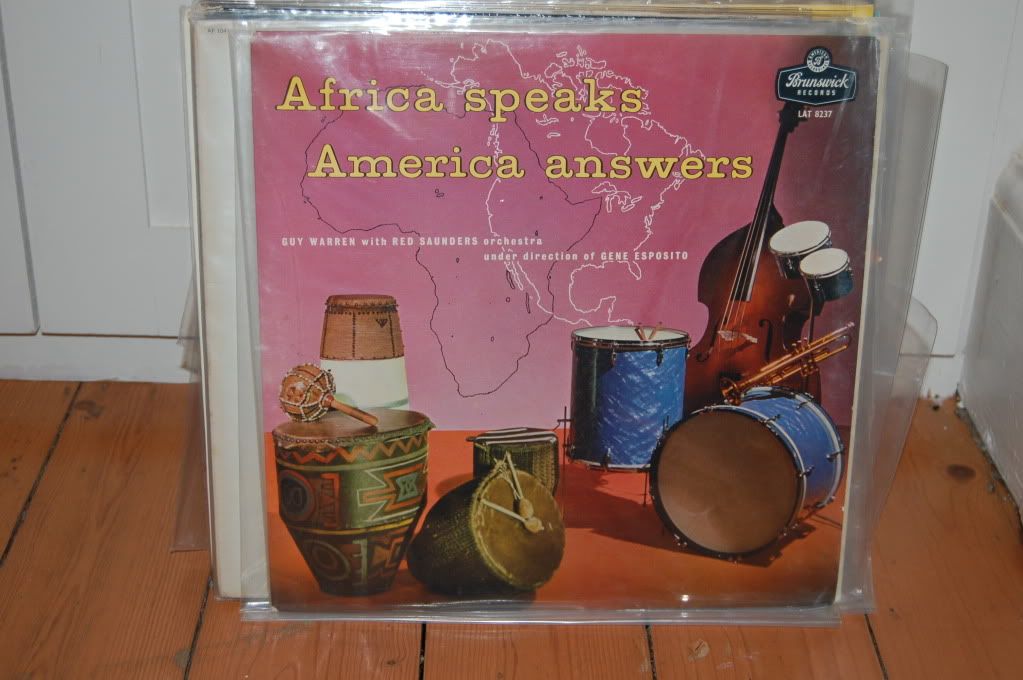Guy Warren arrived in the US in 1954 and having played in London with Kenny Graham's Afro-Cubists (if anyone has any recordings of Warren with the band let me know!) and in Ghana with ET Mensah, he quickly found gigs, albeit not immediately very lucrative.
Through a contact at Down Beat magazine he met Gene Esposito who hired him to join his Latin Jazz band, which was composed entirely of Italian and Jewish musicians. He also met Red Saunders, again through connections. Saunders was a veteran drummer who had played with Albert Ammons and Joe Williams. Through Saunders, Warren secured a recording date at Decca. Saunders would play on the record but only minimally, despite receiving top billing and a hefty slice of the royalties.
It may, on paper, have sounded like an unpromising combination but Warren was able to marshall his forces and pull of a coup.
As I've mentioned in reviews of Warren's later LPs, he was never interested in producing jazz with an African flavour but was rather determined to produce a hybrid of the jazz played in America and the jazz played in Africa. The music on this record, considering it was his first LP as leader, is an amazing mix of highlife, traditional African music and American jazz. That the mix not only works but that he manages to get the right combination of all the differing elements (and managed to get his diverse band to play at the top of their game) is, I believe a tribute to his advanced vision and musicianship.
The record opens with Guy and band members chanting - presumably Africa speaking! Warren then plays the bamboo drums, the first example of a wide variety of African percussion instruments used throughout the album. Where Warren's playing and overall musical vision differs from those of percussionists such as Olatunji is that he employs traditional instruments in the service of modern music rather than jazzed up versions of African songs. Just as the listener thinks the track is going nowhere it takes a sudden swerve (or should I say fade out) into a more forceful and muscular direction. It is almost as though, having started to speak softly and attractively, Africa is now speaking directly and demanding to be heard as an equal. It is a great introduction.
Ode to a Stream, like the later My Minuet, seems to me to owe something to the European classical tradition, in this case to the impressionist composers. Johnny Frigo plays the violin solo. Frigo would go on to record some interesting but scarce records for modern dance. Maybe we'll get to this one day!
Duet sees Warren playing with Red Saunders. I must admit that while it is interesting, Saunders is just too conventional against Warrens imaginative percussive onslaught. Not I suspect Saunders' fault but Warren is just better!
Eyi Wala Don (My Thanks to God) has some great piano-work from Gene Esposito while Warren plays the drums. Can someone tell me what he is saying?
Monkies and Butterflies on one of my favourite tracks on the record and in fact one of my overall favourite of all Warren's songs. The band really comes together there, particularly Esposito and Johnny Lamonica on trumpet.With the female vocals in the background this is such a happy track.
The first side closes with J.A.I.S.I (Jazz as I see It). While very enjoyable, compared to the previous track, it just seems too conventional to my ears, although the conga and bass interplay and solos are a highlight.
Side two kicks off with Invocation of the Horned Viper. As ever Warren's playing is terrific. I can't help feel, however, that overall it is a little too 'exotica'. What do you think?
Chant continues the adoption of traditional music, in this case, a drum ritual to accompany a dead body being carried to a cemetery. Just as it is about the go the way of its predecessor, the piano and sax come in to add a jazz element.
My Minuet is a very strange song indeed. I would love to know more about it. The sleeve notes very unhelpfully just say that it is "almost 18th Century Drawing Room style". What were Warren's influences to create such a song?
The Highlife is, to my ears, surprisingly flat when you consider that Warren was a key part of highlife music in Ghana. I think the most off-putting aspect of it are the lyrics which are incredibly trite.
I like the Eyes of the Fawn. The horn section really seem to be comfortable with it, perhaps because it allows them space to improvise over the top of Warren's playing. For some reason it makes me think of some of the experiments of Kenny Graham in the UK!
Finally FE-ED-TO-NE closes the record with a bang. What a great track! It perfectly pulls together the various elements of jazz from both continents into a perfect blend that allows both to come out. The beginning of Warren's singing and playing, gives way to Esposito's driving piano solo. He is joined by the horn section which pulls the track in a more 'American', West Coast-cool direction. The Warren comes back in to finish the track. Africa and America are in conversation but Africa has the last word.

another version is an ep on the brunswick label called Africa Speaks i just bought this as an african music lover.here are four songs on it which probably came from the album mentioned above.
ReplyDelete